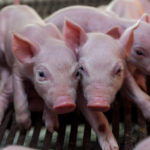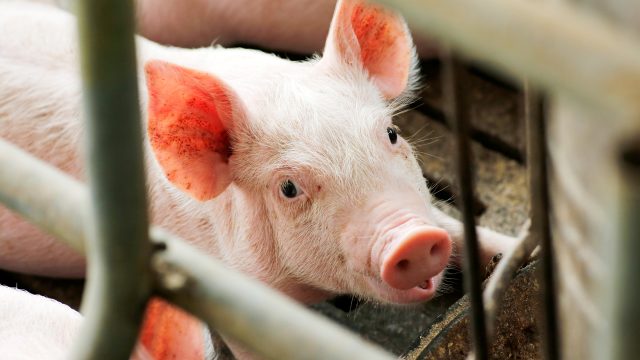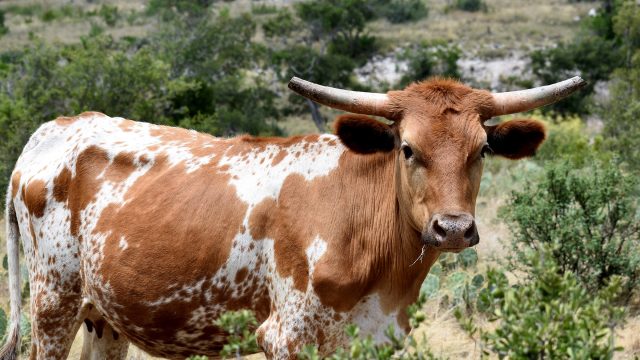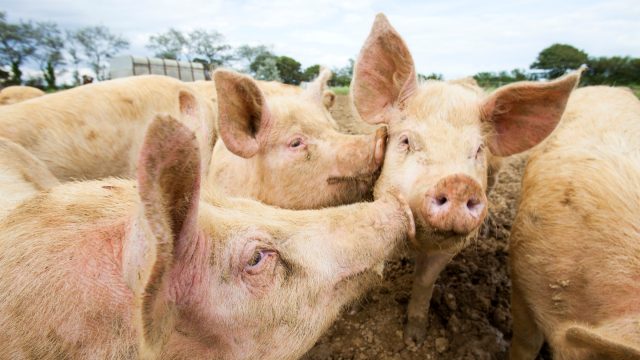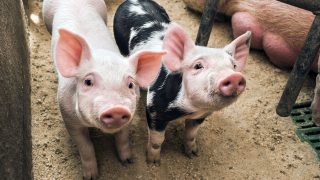
Though Ruled Unconstitutional, Industry Continues Pushing Ag-Gag Laws: Updates in North Carolina, Kansas, Iowa, and Ontario
By Nicole Pallotta, PhD, Senior Policy Program Manager
Intro/summary
Summary: In the first half of 2020, there were multiple developments — some positive and some negative — in the realm of Ag-Gag laws, so named because they criminalize whistleblowing and undercover investigations in agricultural facilities,1 thus “gagging” activists and others who expose animal abuse in factory farms and slaughterhouses.
Passed at the behest of politically powerful agribusiness corporations, Ag-Gag laws enhance criminal penalties, beyond those contained in already-existing trespass laws, when the incident involves an agricultural facility — in essence, creating a new category of criminal behavior that targets animal advocates. Ag-Gag laws chill free speech, hide animal abuse, and shield the animal agriculture industry from public scrutiny and accountability.
In positive news, North Carolina’s Ag-Gag law has been struck down as unconstitutional. The ruling was the result of a lawsuit filed by a coalition that included the Animal Legal Defense Fund. Earlier in 2020, Kansa’s Ag-Gag law — the oldest in the U.S. — was also ruled unconstitutional following a challenge by the Animal Legal Defense Fund and others. However, in Iowa, a new law to specially protect animal agriculture was quietly passed amid ongoing challenges to the state’s Ag-Gag laws. And outside the U.S., an Ag-Gag law was passed in Ontario, despite vigorous opposition from Canadian animal advocates and other groups. This followed the passage of Canada’s first Ag-Gag law six months prior in Alberta.
Criminalizing Investigations, Not Animal Abuse
Rather than alleviating the problematic conditions that give rise to the farmed animal cruelty revealed time and again in undercover footage, Ag-Gag laws punish those who would shine a light on these conditions. Institutional animal abuse thrives in the dark, and Ag-Gag laws are aptly sometimes also called “Anti-Sunshine Laws.”2 The antithesis of transparency, these laws create a special — and unconstitutional — shield for the animal agriculture industry to keep its practices, which involve millions of living, feeling animals, hidden from public scrutiny and the attention of law enforcement. Ag-Gag laws baldly attempt to place a single powerful industry virtually above the law.3
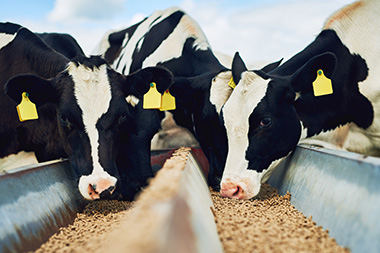 Beyond enabling businesses to treat animals in whatever manner they want behind closed and locked doors, Ag-Gag laws set a troubling precedent more broadly in a democratic society. Many newspapers have issued statements against Ag-Gag laws, as freedom of speech is foundational to a free press — both of which are guaranteed rights under the First Amendment. In an illustrative example, the editorial board of the Pittsburgh Post-Gazette noted after the North Carolina decision:
Beyond enabling businesses to treat animals in whatever manner they want behind closed and locked doors, Ag-Gag laws set a troubling precedent more broadly in a democratic society. Many newspapers have issued statements against Ag-Gag laws, as freedom of speech is foundational to a free press — both of which are guaranteed rights under the First Amendment. In an illustrative example, the editorial board of the Pittsburgh Post-Gazette noted after the North Carolina decision:
Agricultural industry advocacy groups have lobbied aggressively for ag-gag laws in states throughout the country, attempting to protect industrial farms from criticism. But these laws fly in the face of American values and a longstanding history of accountability in the agricultural industry. Dating back to Upton Sinclair’s 1906 expose ‘The Jungle,’ whistleblowers and activists have played an integral role in exposing malfeasance in the food industry. Sinclair’s effort famously led to the passage of the federal Meat Inspection Act and the eventual formation of the Food and Drug Administration. In recent years, whistleblowing has exposed shameful conditions at factory farms, including rampant animal abuse. The First Amendment has protected all of these noble efforts. But ag-gag laws are a clear attempt to usurp these constitutional protections.
The editorial board for the New York Times — which also submitted amicus briefs in our cases — likewise opined against North Carolina’s law in 2016, concluding that undercover investigations have resulted in important policy reforms, such as California’s Prevention of Cruelty to Farm Animals Act,4 and that “the secrecy promoted by ag-gag laws should have no place in American society:”
Factory farm operators believe that the less Americans know about what goes on behind their closed doors, the better for the industry. That’s because the animals sent through those factories often endure an unimaginable amount of mistreatment and abuse. . . . Nearly always, this treatment comes to light only because courageous employees . . . take undercover video and release it to the public. The industry should welcome such scrutiny as a way to expose the worst operators. Instead, the industry’s lobbyists have taken the opposite approach, pushing for the passage of so-called “ag-gag” laws, which ban undercover recordings on farms and in slaughterhouses.
Because animal agriculture facilities operate in secret with virtually no accountability to anyone outside the industry, investigations are almost the only way to document the conditions that animals are forced to endure in factory farms and slaughterhouses. Footage obtained from within agricultural facilities has repeatedly revealed both institutional cruelty — that which is routine and inherent to the profit-driven factory farming business model, such as intensive confinement — and individual abuses, such as the egregious acts of violence committed against animals by workers that have been repeatedly documented in agricultural facilities across the country.
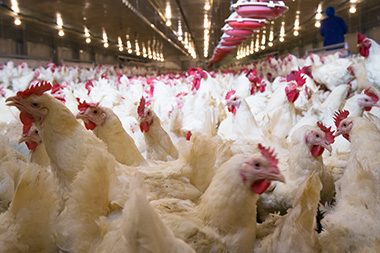 Instead of punishing undercover investigators and workers who come forward to report farmed animal abuse with fines and jail time, our legal system must punish those who are responsible for the abuse, and protect whistleblowers, animals, and other vulnerable individuals.
Instead of punishing undercover investigators and workers who come forward to report farmed animal abuse with fines and jail time, our legal system must punish those who are responsible for the abuse, and protect whistleblowers, animals, and other vulnerable individuals.
Courts have generally agreed with this position. Coalitions including the Animal Legal Defense Fund have been successful in challenging Ag-Gag laws in Iowa, Idaho, Utah, Kansas, Wyoming, and now North Carolina — all of which were ruled unconstitutional on free speech grounds by federal courts.5
North Carolina’s Ag-Gag Law Struck Down as Unconstitutional
On June 12, 2020, in a 73-page ruling, Chief Justice Thomas Schroeder of the Middle District Court of North Carolina overturned North Carolina’s Ag-Gag law as unconstitutional. After initially dismissing the case, Judge Schroeder was directed in 2018 by the 4th U.S. Circuit Court of Appeals to review it again. On appeal, he found that subsections of the law violated the First Amendment.
The North Carolina Property Protection Act, also known as the “Anti-Sunshine Law,” differed from most other Ag-Gag laws in that it created a civil cause of action, rather than criminal liability — meaning anyone who conducted undercover investigations, or exposed improper or unlawful conduct by North Carolina employers, could be sued for substantial damages. It also applied to a wider array of businesses beyond agricultural facilities, including elder care facilities, day care centers, and other institutions where abuses against vulnerable populations have been repeatedly documented.
North Carolina’s Ag-Gag law became effective in 2016, after the North Carolina General Assembly overrode a gubernatorial veto. That same year, the Animal Legal Defense Fund filed a lawsuit with a coalition of animal protection, consumer rights, food safety, and whistleblower protection groups.6 As noted above, Ag-Gag laws are of particular concern to journalists, and a coalition of more than 20 media organizations filed a brief supporting this lawsuit. According to the Winston-Salem Journal:
In 2015, then-Gov. Pat McCrory had vetoed the Property Protection Act, saying the measure pushed by fellow Republicans fell short of protecting honest workers who uncover criminal activity. Other critics of the bill said it would halt exposés of animal cruelty at farms and meat-packing plants or intimidate nursing home workers from reporting elder abuse.
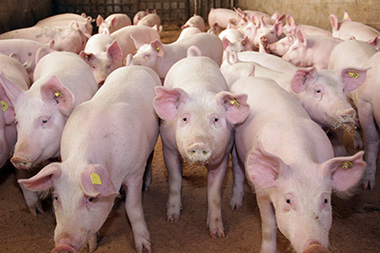 The purported intent behind North Carolina’s Ag-Gag law was to strengthen the state’s trespass law. Legislators’ floor statements — quoted in the opinion and partially cited by Defendants7 — included the following:
The purported intent behind North Carolina’s Ag-Gag law was to strengthen the state’s trespass law. Legislators’ floor statements — quoted in the opinion and partially cited by Defendants7 — included the following:
So what’s the bill really do? Well, first of all, it codifies and strengthens North Carolina trespass law to better protect property owners’ rights. And it puts teeth into North Carolina trespass law by providing up to $5000 per day penalty for a violation.
However, the court found this argument unpersuasive. After correcting Defendants in a footnote —pointing out that “the Act actually provides $5,000 per day in exemplary damages, not ‘up to’ $5,000” — Judge Schroeder found the Ag-Gag law superfluous because “there is no indication in the record that property protection under North Carolina’s existing trespass law was unsuccessful.” He further explained:
While Defendants and Intervenor have identified a legitimate governmental interest in protecting private property, they have failed to demonstrate through evidence that the Property Protection Act is narrowly tailored to further that interest or that existing laws, such as trespass, are insufficient to address the problem.
Judge Schroeder also rejected Defendants’ argument that the law “regulates conduct as opposed to speech” and ruled that “recording is protected speech.” He further noted that the “attempt to categorize image capture and recording following a trespass under the Act as unprotected speech rests on a misreading of the law.”
The decision summarized:
Given the plans of Plaintiffs PETA and ALDF to conduct undercover investigations of potential employers, the prohibitions in subsections (b)(1) and (b)(5) are unconstitutional as applied to the speech they regularly engage in . . . As to subsections (b)(2) and (b)(3), these provisions will always target speech, and speech will always be the activity that triggers liability. No set of circumstances changes the fact that these subsections, as written, are unconstitutional under the First Amendment, and as such, are facially invalid. Where a statute is unconstitutional in every scenario, the appropriate remedy is to strike down the law on its face.
Permanent Injunction Granted After Kansas Ag-Gag Victory
In January 2020, the U.S. District Court for the District of Kansas struck down as unconstitutional the state’s 30-year old Ag-Gag law. Enacted in 1990, until this decision, Kansas had the distinction of having the oldest Ag-Gag law in the U.S. This victory followed a lawsuit brought in 2018 by an Animal Legal Defense Fund-led coalition of animal, environmental, and community advocacy groups.8
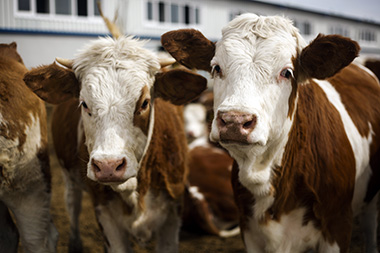 Before the court were three main questions, each flowing from the previous. First, did the statute regulate speech or merely conduct? Judge Kathryn H. Vratil disagreed with Defendants’ claim that the statute prohibited only conduct (i.e., trespass), finding it did in fact regulate speech.9 The next question was whether these regulations were content-based or content-neutral.10 Judge Vratil agreed with Plaintiffs that relevant subsections of the statute unconstitutionally targeted animal activists and were content-based and viewpoint-discriminatory. She next examined Defendants’ claim that the law targeted unprotected speech — narrow categories of speech that are free from First Amendment scrutiny and may be lawfully restricted by the government — and found that:
Before the court were three main questions, each flowing from the previous. First, did the statute regulate speech or merely conduct? Judge Kathryn H. Vratil disagreed with Defendants’ claim that the statute prohibited only conduct (i.e., trespass), finding it did in fact regulate speech.9 The next question was whether these regulations were content-based or content-neutral.10 Judge Vratil agreed with Plaintiffs that relevant subsections of the statute unconstitutionally targeted animal activists and were content-based and viewpoint-discriminatory. She next examined Defendants’ claim that the law targeted unprotected speech — narrow categories of speech that are free from First Amendment scrutiny and may be lawfully restricted by the government — and found that:
Content-based restrictions are permissible in a few historic and traditional categories of expression. Alvarez, 567 U.S. at 717 (categories of unprotected speech include incitement to lawless action, obscenity, defamation, child pornography, fraud, true threats and speech integral to criminal conduct). In Alvarez, the Supreme Court addressed whether false speech was one such category of unprotected speech. At issue was the Stolen Valor Act, 18 U.S.C. § 704, which criminalized false claims of receiving the Congressional Medal of Honor. Id. at 713. In a plurality opinion, the Supreme Court declined to add false speech to the list of categorically unprotected speech but determined that the government may prohibit false speech when it is associated with a legally cognizable harm. Id. at 719-22. . . . Here, defendants cannot regulate only false speech that is intended to damage enterprises conducted at animal facilities (i.e. made with intent to damage animal facilities). Accordingly, K.S.A. § 47-1827(b), (c) and (d) are not exempt from First Amendment scrutiny.
While an important victory, the court failed to grant a permanent injunction against enforcing this law, which Plaintiffs had sought. The coalition filed a motion to amend the order issued in January 2020 to include a permanent injunction — it was granted in April 2020.
The state opposed the motion for a permanent injunction, asserting that Kansas’s statute was unconstitutional only as applied to Plaintiffs, not on its face. The main issue was whether this law might be used against other parties in the future. Despite having been found unconstitutional, without a permanent injunction, the potential for the statute to be enforced lingered.
The state argued that injunctive relief was not necessary because it did not intend to violate the court’s order and that it has never prosecuted, or threatened to prosecute, anyone under Kansas’s Ag-Gag law. Judge Vratil was skeptical of this claim:
Although defendants assert that they will abide by the Court’s decision, as the law requires, their assertion gives plaintiffs little assurance that future defendants will not enforce the unconstitutional provisions against others who assert their First Amendment rights. Indeed, defendants’ response to plaintiffs’ motion indicates that defendants believe that they can enforce K.S.A. § 47-1827(b), (c) and (d) against other potential plaintiffs.
In granting the permanent injunction, she concluded that:
Defendants’ arguments confirm that without a permanent injunction, K.S.A. § 47-1827(b), (c) and (d) continue to chill exercise of First Amendment rights, and that nothing prevents defendants from attempting to enforce the unconstitutional provisions. To ensure compliance with the Court’s determination that K.S.A. § 47-1827(b), (c) and (d) violate the First Amendment, the Court permanently enjoins enforcement of those provisions.
Kansas has appealed both the January and April decisions and the parties are currently briefing the appeal in the U.S. Court of Appeals for the Tenth Circuit. Oral argument is expected to be held sometime in 2021.
A few weeks before winning the permanent injunction in Kansas, the Animal Legal Defense Fund, along with a coalition of public interest groups,11 filed an appeal in our lawsuit challenging Arkansas’s Ag-Gag law as violating the First and Fourteenth Amendments. This appeal, filed in the U.S. Court of Appeals for the Eight Circuit in St. Louis, follows a February 2020 dismissal by the lower court. We are confident Arkansas’s Ag-Gag law, which was enacted in 2017, will also be found unconstitutional.
Our efforts to overturn Ag-Gag laws continue to be supported by a wide array of public interest organizations and legal scholars. Some who filed amicus briefs in our Kansas and Arkansas appeals include the Reporters Committee for Freedom of the Press and individual media entities, including the New York Times and the Washington Post; the ACLU of Kansas; the ACLU of Utah; First Amendment scholars, including Dean Erwin Chemerinsky; the United Food and Commercial Workers International Union; and the United Farm Workers of America.
Iowa Enacts New Law to Protect Animal Agriculture Amid Ongoing Legal Challenge
On June 10, 2020, a few days before North Carolina’s Ag-Gag law was struck down, Iowa Gov. Kim Reynolds signed SF 2413 — the state’s latest attempt to enact a law to specially protect the state’s animal agriculture industry. Iowa’s Ag-Gag laws have followed high-profile undercover investigations that revealed abusive treatment of animals on factory farms, and this law was similarly passed in response to undercover footage exposing the methods used to conduct mass killings of pigs on Iowa farms.
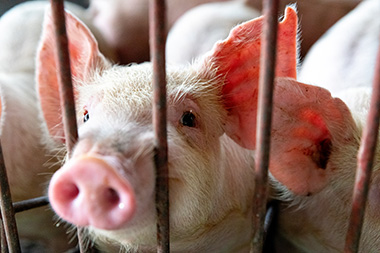 Passed in 2012, Iowa’s first Ag-Gag law was overturned by a federal judge in January 2019 on constitutional grounds, following a lawsuit by the Animal Legal Defense Fund and other groups.12 Iowa legislators then enacted a second Ag-Gag law, which was substantively similar to the first. The Animal Legal Defense Fund also challenged this new law, known as Ag-Gag 2.0. In December 2019, the U.S. District Court for the Southern District of Iowa denied the state’s attempt to have the lawsuit dismissed and issued a preliminary injunction to stop enforcement while the lawsuit proceeds.
Passed in 2012, Iowa’s first Ag-Gag law was overturned by a federal judge in January 2019 on constitutional grounds, following a lawsuit by the Animal Legal Defense Fund and other groups.12 Iowa legislators then enacted a second Ag-Gag law, which was substantively similar to the first. The Animal Legal Defense Fund also challenged this new law, known as Ag-Gag 2.0. In December 2019, the U.S. District Court for the Southern District of Iowa denied the state’s attempt to have the lawsuit dismissed and issued a preliminary injunction to stop enforcement while the lawsuit proceeds.
On June 10, the state quietly passed a new law (which was signed by the governor the same day) as part of a broader farm bill that pertained mostly to pandemic relief. As reported by The Intercept, “the latest version was buried at the bottom of an agriculture bill that largely addressed coronavirus-related concerns. Iowa’s legislature, which had been suspended since the pandemic began, only returned to work last week.”
SF 2413 creates a new crime of “food operation trespass,” which carries enhanced penalties above those already existing in Iowa trespass laws — including a felony provision for a second offense:
A person commits food operation trespass by entering or remaining on the property of a food operation without the consent of a person who has real or apparent authority to allow the person to enter or remain on the property. . . . For a first offense, a person who commits food operation trespass. . . is guilty of an aggravated misdemeanor. For a second or subsequent offense, a person who commits food operation trespass. . . is guilty of a class “D” felony.
As with Ag-Gag laws, Iowa’s law is designed to target animal advocates and others who would expose unlawful conduct on factory farms.
Ontario Enacts Canada’s Second Ag-Gag Law
In Canada, despite vigorous efforts by animal advocates and others to defeat it, Bill 156 passed in Ontario on June 18, 2020. This is Canada’s second Ag-Gag law, with Alberta being the first province to enact one in November 2019.
While substantively similar to U.S. Ag-Gag laws, Ontario’s new law goes further in criminalizing peaceful protests and vigils outside slaughterhouses. The section addressing vigils outside slaughterhouses — absurdly referred to as “animal protection zones” — reads:
Subsection 5 (4) prohibits persons from interfering or interacting with farm animals in or on the animal protection zones or from carrying out prescribed activities in or on the animal protection zones without the prior consent of the owner or occupier of the farm, facility or premises. Section 6 prohibits persons from interfering with a motor vehicle that is transporting farm animals and from interfering or interacting with the farm animals in the motor vehicle without the prior consent of the driver of the motor vehicle.
Advocates with the Animal Save Movement, founded by Toronto activist Anita Kranjc, regularly hold peaceful vigils outside slaughterhouses in Ontario and worldwide. In 2015, Kranjc was arrested and charged with criminal mischief for “interference with the use, enjoyment and operation of property” after giving water to overheated pigs confined in a hot trailer outside a slaughterhouse on a sweltering summer day. Kranjc was eventually acquitted following a high-profile trial that received international media coverage and shined a spotlight on the callous treatment of farmed animals. As noted by Camille Labchuck of Animal Justice, “it’s clear that this did not go over well with the farm industry.”
On June 19, two days after Bill 156 passed, long-time activist Regan Russell was tragically struck and killed by the driver of a slaughterhouse truck while peacefully protesting this law and taking part in a vigil with Toronto Pig Save. The Animal Save Movement reports that Russell, along with six other activists, was giving water to pigs outside a slaughterhouse on one of the hottest days of the year when she was killed by the truck driver, who was charged with “careless driving causing death”13 — a charge decried by activists and her family as inadequate and out of proportion with the severity of the crime.
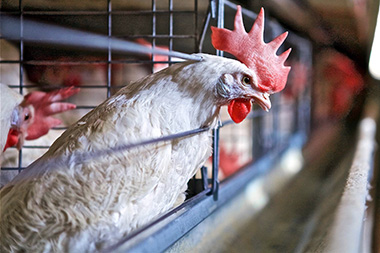 The Save Movement, which is fighting to have Ontario’s Ag-Gag law repealed, notes that “bearing witness at animal vigils is a basic right to freedom of expression” and argues this law “is likely to increase the risk of dangerous driving by slaughterhouse truck drivers, since it offers farmer protection against civil liability from anyone hurt while contravening the act.”
The Save Movement, which is fighting to have Ontario’s Ag-Gag law repealed, notes that “bearing witness at animal vigils is a basic right to freedom of expression” and argues this law “is likely to increase the risk of dangerous driving by slaughterhouse truck drivers, since it offers farmer protection against civil liability from anyone hurt while contravening the act.”
As with U.S. Ag-Gag laws, Ontario’s law appears redundant, given existing trespass laws, and likely unconstitutional.14 According to Animal Justice:
Bill 156 is similar to ag gag laws that have been struck down as unconstitutional by courts in Idaho, Utah, Iowa, Kansas, and North Carolina. Over 40 Canadian legal experts wrote to the government in February to advise that Bill 156 is unconstitutional because it attacks freedom of expression and could make investigative journalism at farms and slaughterhouses illegal. . . . Although the government has described Bill 156 as an attempt to crack down on farm trespassers, trespassing on farms is already illegal under the Trespass to Property Act, with some of the highest fines in the country. Instead, the bill targets whistleblower exposés and lawful protests outside slaughterhouses.
Conclusion
The Animal Legal Defense Fund is leading the fight against Ag-Gag laws and for greater transparency in animal agriculture. In addition to lawsuits that have resulted in existing Ag-Gag laws being struck down, we work to defeat new legislation that would quash free speech and enable the multi-billion-dollar-per-year agriculture industry to hide — even more than it already does — the cruelty that animals routinely endure on factory farms and in slaughterhouses. This includes abuse that is inherent to the factory farming business model (such as intensive confinement, which causes animals to experience tremendous physical and psychological distress) and individual acts of torture by workers,15 such as punching, kicking, and dragging wounded or sick animals.
More transparency is urgently needed in animal agriculture, not less. With broad implications for animal protection, worker rights, environmental justice, and public health,16 the animal agriculture industry must not be allowed to seek cover behind unconstitutional special protections that enable it to operate in secret with no public accountability for its practices, including the mistreatment of countless vulnerable animals who — with scant legal protections — are trapped inside windowless sheds behind closed and tightly locked doors.
Further Reading
- Wells, Stephen. “‘Ag-Gag’ Laws Expose Whistleblowers to Prosecution for Reporting Animal Abuse.” December 15, 2019.
- Greenwald, Glenn. “Hidden Video and Whistleblower Reveal Gruesome Mass-Extermination Method for Iowa Pigs Amid Pandemic.” The Intercept. May 29, 2020.
- Starostinetskaya, Anna. “5 Quotes from the Man who Helped Overturn Idaho’s Ag-Gag Law.” VegNews. August 5, 2015.
References
- Some states’ Ag-Gag laws are constructed more broadly and may also cover pet stores, research labs, or nursing homes, for example.
- So-called “Sunshine Laws” require transparency and disclosure in business and government.
- See our brochure, “Farmed Animals and the Law,” for more on how the legal system shields the animal agriculture industry from accountability and leaves billions of vulnerable animals unprotected.
- Passed in 2008 and strengthened in 2018, the Prevention of Cruelty to Farm Animals Act outlaws the most extreme methods of confining farmed animals in California, and bans the sale of products produced in other states using these methods. Covered under this law are calves raised for veal, pregnant pigs, and egg-laying hens.
- For more information and a timeline of legal developments, visit our Ag-Gag webpage.
- Our co-plaintiffs were People for the Ethical Treatment of Animals, Center for Food Safety, Farm Sanctuary, Food & Water Watch, Government Accountability Project, Farm Forward, and American Society for the Prevention of Cruelty to Animals.
- Defendants in this case were the Attorney General of North Carolina and the Chancellor of the University of North Carolina-Chapel Hill, with the North Carolina Farm Bureau added as Defendant-Intervenor.
- The coalition, which includes the Center for Food Safety and local farmed animal sanctuaries Shy 38 Inc. and Hope Sanctuary, is represented by Public Justice, leading First Amendment scholars, and attorneys with the plaintiff organizations.
- While Defendants argued that the statute did not regulate speech, they asserted that even if it did, this speech was unprotected, a claim with which Judge Vratil did not agree.
-
As explained in the decision:
Government regulation of speech is content-based if it restricts speech based on the topic it discusses or the idea or message it expresses. Reed, 135 S. Ct. at 2227. A content-based regulation requires enforcement authorities to examine the content of the message to determine whether plaintiffs have violated the law. McCullen v. Coakley, 573 U.S. 464, 479 (2014). In addition, even if a law is content-neutral on its face, the Court considers it content-based if it cannot be justified without reference to the content of the regulated speech, or if the government adopted it because of disagreement with the message it conveys. Id. Viewpoint discrimination is a particularly egregious subset of content-based discrimination. Pahls v. Thomas, 718 F.3d 1210, 1229 (10th Cir. 2013) (citing Rosenberger v. Rectors & Visitors of Univ. of Va., 515 U.S. 819, 829 (1995)). Instead of targeting the subject-matter, a viewpoint-discriminatory regulation targets the particular views of a speaker on a subject and regulates speech based on the speaker’s specific motivating ideology, opinion or perspective.
- The coalition includes Animal Equality, the Center for Biological Diversity, and Food Chain Workers Alliance.
- The plaintiff coalition includes the Animal Legal Defense Fund, People for the Ethical Treatment of Animals (PETA), the Center for Food Safety, Iowa Citizens for Community Improvement, and Bailing Out Benji.
-
“Careless Driving Death is not a criminal offense. It falls under a provincial regulatory statute dealing with traffic violations like failure to signal. Those convicted of the offense do not have a criminal record and may be fined between $2000 and $50,000 and face up to two years in prison.” For more, see: The Animal Agriculture Industry: Liability Proof?
- Similar to the U.S.’s First Amendment, Canada’s constitution protects “freedom of expression.”
- Although nothing excuses gratuitous acts of violence committed against helpless animals, it is important to note that systems of oppression are interconnected and workers who abuse animals are themselves victimized by the exploitive and often dangerous labor conditions that are the norm in agricultural facilities. Sometimes these acts are the end result of a system that forces workers to move animals, even those who are wounded, as quickly as possible to keep up with very high line speeds. And many farm and slaughterhouse workers are undocumented immigrants, making it difficult for them — even without Ag-Gag laws — to speak out against animal cruelty. Faced with the ever-present threat of deportation, they stand to lose not only their job but also their home if they speak against their employer.
- On the public health impacts of animal agriculture, particularly zoonotic disease and pandemic risk, see the Animal Legal Defense Fund’s white paper, “COVID-19 Policy Recommendations.”
Stop Ag-Gag Laws
Undercover investigations and whistleblowers have exposed some of the worst aspects of factory farming, but Ag-Gag laws punish people who speak out about cruelty in animal agriculture. Voice your opposition.
Related
-
Lawsuit Filed Against Pig Breeder Holden Farms Related to Feeding Dead Piglets’ Intestines and Feces to Mother Pigs and Other Offenses
Animal Legal Defense Fund filed a false claims lawsuit against Holden Farms. Allegations include violating federal and state laws banning “garbage feeding” and state animal cruelty law.August 10, 2023 Press Release -
$5,000 Reward for Information Regarding Six Killed and Mutilated Cows in Three Texas Counties
Cows were killed in Madison, Brazos, and Robertson Counties, Texas.May 3, 2023 Press Release -
Fourth Circuit Enjoins North Carolina Ag-Gag Law
The U.S. Court of Appeals for the Fourth Circuit handed an important win to plaintiffs in a lawsuit challenging North Carolina’s Ag-Gag law, ruling that undercover investigations and whistleblowing are considered newsgathering activities protected by the First Amendment.February 23, 2023 Press Release

